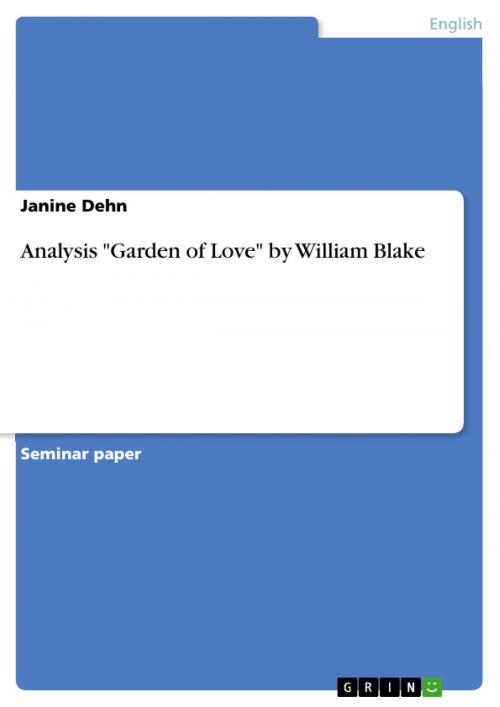Analysis 'Garden of Love' by William Blake
Fiction & Literature, Literary Theory & Criticism, British| Author: | Janine Dehn | ISBN: | 9783640312931 |
| Publisher: | GRIN Publishing | Publication: | April 17, 2009 |
| Imprint: | GRIN Publishing | Language: | English |
| Author: | Janine Dehn |
| ISBN: | 9783640312931 |
| Publisher: | GRIN Publishing |
| Publication: | April 17, 2009 |
| Imprint: | GRIN Publishing |
| Language: | English |
Seminar paper from the year 2006 in the subject English Language and Literature Studies - Literature, grade: 1,0, University of Potsdam (Institut für Anglistik und Amerikanistik ), course: Britisch Poetry since Romanticism, language: English, abstract: 'Both read the Bible day and night; but you read black where I read white.' William Blake I'd like to start my analysis of William Blake's 'The Garden of Love' with those lines by William Blake. He refers to the way he's reading the bible compared to the way the church is interpreting it. I think that this quotation reflects the contradictions and ambiguous relations between William Blake and the Church of England. Or rather, the way the Church of England was interpreting the Bible and how they wanted the Bible to be read and comprehended by common people. This is connected to the poem, which is a criticizing the Church of England. 'The Garden of Love' was published in 1794 as part of the 'Songs of Experience'.
Seminar paper from the year 2006 in the subject English Language and Literature Studies - Literature, grade: 1,0, University of Potsdam (Institut für Anglistik und Amerikanistik ), course: Britisch Poetry since Romanticism, language: English, abstract: 'Both read the Bible day and night; but you read black where I read white.' William Blake I'd like to start my analysis of William Blake's 'The Garden of Love' with those lines by William Blake. He refers to the way he's reading the bible compared to the way the church is interpreting it. I think that this quotation reflects the contradictions and ambiguous relations between William Blake and the Church of England. Or rather, the way the Church of England was interpreting the Bible and how they wanted the Bible to be read and comprehended by common people. This is connected to the poem, which is a criticizing the Church of England. 'The Garden of Love' was published in 1794 as part of the 'Songs of Experience'.















